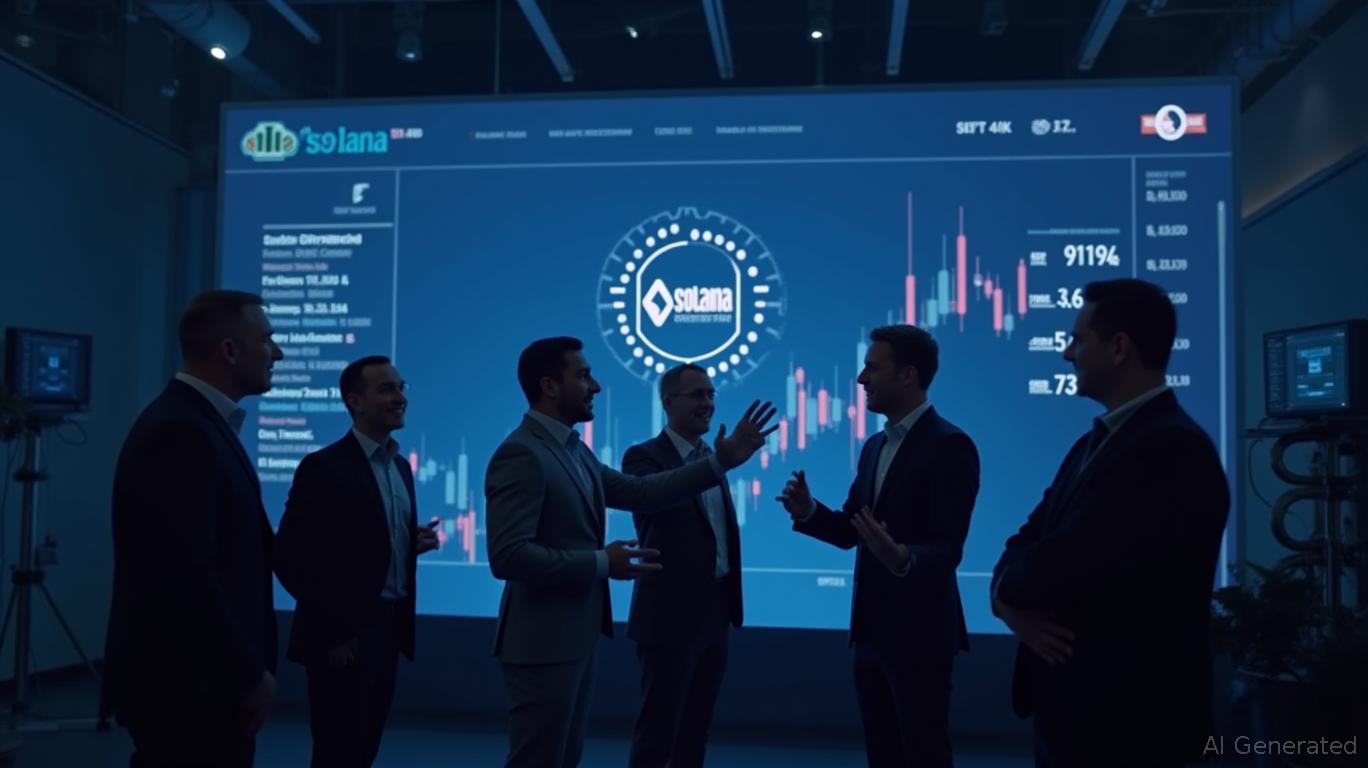Solana News Today: Institutional Money Moves to Solana—What Does It Mean for Crypto’s Future?
- Solana outpaces Ethereum in DEX volume, driven by institutional investments and network upgrades like Alpenglow. - Institutional holdings of $1.72B and 6.86% staking yield signal growing confidence in Solana's long-term potential. - Solana's 17% price surge vs. Ethereum's 6% reflects its appeal for high-throughput DeFi/NFTs, though Ethereum retains Layer 2 liquidity advantages. - Upcoming upgrades aim to boost Solana's throughput, while Ethereum targets 10M TPS via Layer 2 scaling to maintain institution
Solana has emerged as a leading force in the decentralized exchange (DEX) volume landscape, surpassing Ethereum in key metrics, sparking speculation about whether this momentum will translate to a sustained rise in the price of SOL. On-chain data and market sentiment indicate a shift in liquidity and trading activity toward the high-performance blockchain, which has been bolstered by institutional participation and ecosystem growth.
Network metrics reveal that Solana processes significantly more transactions than Ethereum, with daily volume and active address counts far outpacing its competitor. The Strategic SOL Reserve reports that 13 entities collectively hold $1.72 billion in Solana, with over 8.2 million tokens in institutional hands, representing 1.44% of the total supply. This institutional allocation, coupled with a 6.86% average staking yield, highlights growing confidence in the network’s long-term potential. Staked SOL has also shown a consistent upward trend, increasing from 7.7 million to 8.3 million in a week, signaling strategic, long-term positioning by institutional players.
In terms of price performance, Solana has outperformed Ethereum in the short term. Over the past week, SOL has surged nearly 17%, while Ethereum, despite its larger market capitalization, has only risen by 6%. Solana’s price movement reflects the influence of traders seeking high-throughput Layer 1 solutions, particularly in DeFi and NFT ecosystems. Traders favor the network for quick momentum plays, while Ethereum continues to attract longer-term capital due to its deeper liquidity and robust Layer 2 infrastructure. As of recent data, Solana is trading around $209, with the RSI in a bullish but not overbought range, and the ADX suggesting a well-established trend.
The on-chain fundamentals also highlight Solana’s strengths in throughput and cost efficiency. With average transaction fees at around $0.0003, compared to Ethereum’s $4.02, Solana is increasingly becoming the preferred network for developers and users prioritizing speed and affordability. The network is set to further solidify its position with upcoming upgrades like Alpenglow and Firedancer, which aim to reduce finality latency and increase throughput. These developments are expected to enhance Solana’s appeal for high-frequency trading and decentralized applications.
While Solana’s momentum is undeniable, Ethereum retains its role as the anchor for broader altcoin market dynamics. The Ethereum network supports $44 billion in Layer 2 value, with Arbitrum alone accounting for $19 billion. The network’s 33.8 million staked ETH underscores its institutional appeal, particularly in custody and long-term yield strategies. Ethereum’s roadmap, including Layer 2 scaling and the Lean Ethereum Vision, aims to achieve 10,000 TPS on Layer 1 and 10 million TPS on Layer 2, positioning it as a durable infrastructure for future growth.
The ongoing competition between Solana and Ethereum represents a pivotal chapter in the crypto narrative. Solana’s speed and efficiency make it attractive for short-term traders and high-frequency applications, while Ethereum’s security, liquidity, and composability offer a more resilient foundation for institutional and long-term investors. As altseason gains momentum, capital is expected to rotate into smaller tokens and emerging projects, further diversifying the landscape. However, both networks are likely to benefit from the broader market rotation, each leveraging its unique strengths to secure a position in the evolving blockchain ecosystem.
Source: [1] title1 [2] title2 [3] title3 [4] title4 [5] title5

Disclaimer: The content of this article solely reflects the author's opinion and does not represent the platform in any capacity. This article is not intended to serve as a reference for making investment decisions.
You may also like
The Importance of x402 for Stablecoin Payments
X402+ stablecoins and on-chain crypto infrastructure will gradually and continuously impact the existing payment system. This not only involves the use of stablecoins, but also transfers money, credit, identity, and data into a parallel financial universe.

From "Crime Cycle" to Value Reversion: Four Major Opportunities for the Crypto Market in 2026
We are currently experiencing a "purification" that the market needs, which will make the crypto ecosystem better than ever before, potentially improving it tenfold.

SociFi dream shattered? Farcaster pivots to focus on the wallet track
Past data has shown that the "social-first strategy" is ultimately unsustainable, as Farcaster has consistently failed to find a sustainable growth mechanism for a Twitter-like social network.

Crypto tycoons spend eight-figure annual security fees, just to avoid incidents like Bluezhanfei's experience.
No one understands security better than the crypto industry leaders.
